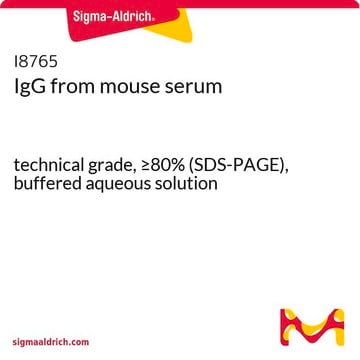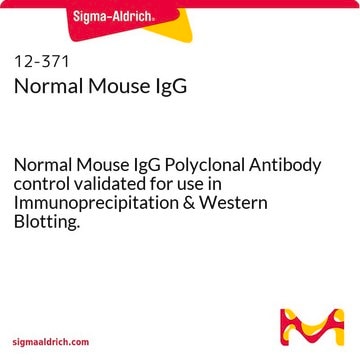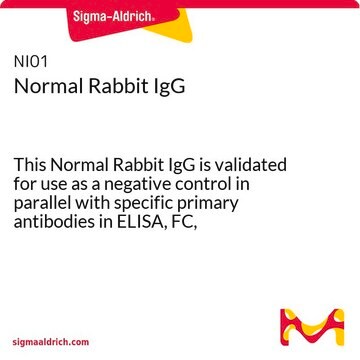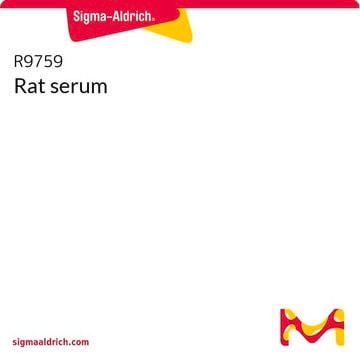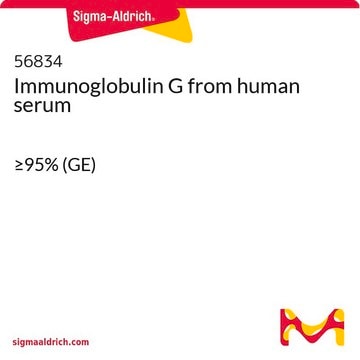I8015
IgG from rat serum
technical grade, ≥80% (SDS-PAGE), buffered aqueous solution
Sinónimos:
Rat IgG
Iniciar sesiónpara Ver la Fijación de precios por contrato y de la organización
About This Item
Productos recomendados
conjugate
unconjugated
grade
technical grade
assay
≥80% (SDS-PAGE)
form
buffered aqueous solution
shipped in
dry ice
storage temp.
−20°C
¿Está buscando productos similares? Visita Guía de comparación de productos
General description
IgG (immunoglobulin G) antibody is enriched in mother′s milk. IgG is a major class of immunoglobulin. It contributes to 10−20% of plasma protein and is regarded as one of the most abundant serum protein. It consists of four subclasses: IgG1, IgG2, IgG3 and IgG4. The IgG structure possesses four polypeptide chains containing two identical γ heavy (H) chains and two identical κ or λ light (L) chains of 50kDa and 25kDa respectively. The chains are interlinked with a disulfide bond. Both the L and the H chains consist of a variable domain at the N-terminal. The C-terminal bears′ constant domains: three in H chain with a hinge region and one in the L chain. The variable region of IgG antibody is specific to antigens and is highly conserved.
Application
IgG from rat serum has been used:
- To block programmed death ligand 1.
- As a control antibody to study the role of integrin b1 in spindle morphology
- In FACS (flow cytometry) staining
- ELISA (enzyme linked immunosorbent assay)
IgG from rat serum was used to block non-specific staining during FACS of peritoneal cells isolated from BALB/c mice. It was used as positive control in VDR staining of male and female breast tumor cells. IgG from rat serum was injected in control mice in tumor transplantation studies.
Biochem/physiol Actions
IgG antibody has its function similar to IgM antibody in complement system activation. IgG participates in hypersensitivity type II and type III. It helps in opsonization, complement fixation and antibody-dependent cell-mediated cytotoxicity.
IgG antibody subtype is the most abundant of serum immunoglobulins of the immune system. It is secreted by B cells and is found in blood and extracellular fluids and provides protection from infections caused by bacteria, fungi and viruses. Maternal IgG is transferred to fetus through the placenta that is vital for immune defense of the neonate against infections.
Physical form
Solution in 0.01 M phosphate buffered saline, pH 7.2, containing 15 mM sodium azide
Disclaimer
Unless otherwise stated in our catalog or other company documentation accompanying the product(s), our products are intended for research use only and are not to be used for any other purpose, which includes but is not limited to, unauthorized commercial uses, in vitro diagnostic uses, ex vivo or in vivo therapeutic uses or any type of consumption or application to humans or animals.
Storage Class
12 - Non Combustible Liquids
wgk_germany
nwg
flash_point_f
Not applicable
flash_point_c
Not applicable
Certificados de análisis (COA)
Busque Certificados de análisis (COA) introduciendo el número de lote del producto. Los números de lote se encuentran en la etiqueta del producto después de las palabras «Lot» o «Batch»
¿Ya tiene este producto?
Encuentre la documentación para los productos que ha comprado recientemente en la Biblioteca de documentos.
Los clientes también vieron
M Boesen et al.
Clinical and experimental immunology, 121(2), 210-215 (2000-08-10)
An attempt was made to identify the selection pressures put upon a growing tumour by CD8+ T cells. To this end tumours induced with 3-methylcholanthrene in T cell-deficient nude mice and in congenic T cell-competent nu/+ mice were transplanted to
Irradiation-tolerant lung cancer cells acquire invasive ability dependent on dephosphorylation of the myosin regulatory light chain
Ishihara S, et al.
Febs Letters, 587(6), 732-736 (2013)
The Immunoglobulins: Structure and Function (1998)
M J Janatpour et al.
The Journal of experimental medicine, 194(9), 1375-1384 (2001-11-07)
Monocytes recruited from the blood are key contributors to the nature of an immune response. While monocyte recruitment in a subset of immunopathologies has been well studied and largely attributed to the chemokine monocyte chemoattractant protein (MCP)-1, mechanisms mediating such
Programmed death 1 signaling on chronic myeloid leukemia-specific T cells results in T-cell exhaustion and disease progression
Mumprecht S, et al.
Blood, 114(8), 1528-1536 (2009)
Nuestro equipo de científicos tiene experiencia en todas las áreas de investigación: Ciencias de la vida, Ciencia de los materiales, Síntesis química, Cromatografía, Analítica y muchas otras.
Póngase en contacto con el Servicio técnico



